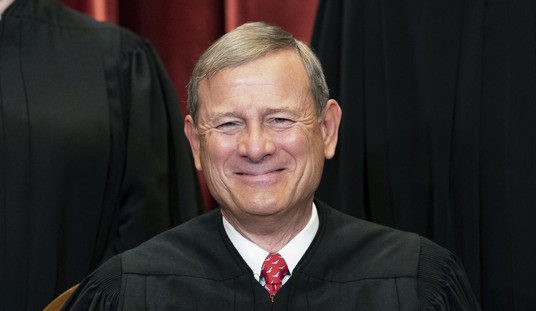Yeah, I don’t know. A tariff-triggered economic slowdown replete with falling jobs numbers and a tanking S&P 500 would feel like a “loss.” Given the likely electoral consequences in November, it would feel like a major loss to congressional Republicans. But oh well. Whatever else can be said about Trump’s new trade-war policy, it can’t be said that it’s a surprise. This is who he is and has always been.
https://twitter.com/realDonaldTrump/status/981492087328792577
https://twitter.com/realDonaldTrump/status/981521901079146499
Man, the fun we on the right would be having right now if President Bernie Sanders had started this trade war instead. The impeachment segments alone on Hannity’s show would be worth it. As it is, no worries: We’ve got plenty of extra GDP to burn before this is over.
https://twitter.com/AaronBlake/status/981555352490692608
The U.S.-China tariffs war will cost 190,000 American jobs and shave some GDP growth from the economy, according to estimate from Moody’s economist. https://t.co/DgKj9UFcCo
— Axios (@axios) April 4, 2018
He’s talking about $50 billion in new Chinese tariffs on soybeans, planes, cars, whiskey and chemicals.
“The assumption was China would not respond too aggressively and avoid escalating tensions. China’s response is a surprise for some people,” said Julian Evans-Pritchard, senior China economist at Capital Economics, noting that neither said had yet called for enforcement of the tariffs…
Unlike Washington’s list, which was filled with many obscure industrial items, China’s list strikes at signature U.S. exports, including soybeans, frozen beef, cotton and other key agricultural commodities produced in states from Iowa to Texas that voted for Donald Trump in the 2016 presidential election.
“This is a real game changer and moves the trade dispute away from symbolism to measures which would really hurt U.S agricultural exports,” said Commerzbank commodities analyst Carsten Fritsch.
“We have been saying that China wouldn’t start a trade war,” said a flack for the Chinese foreign ministry. “But we are not afraid of it, and we will resolutely fight to the end if someone insists on a war.” They’re not messing around: Soybeans are the single biggest U.S. agricultural export to China and the states that produce them are not, shall we say, electorally marginal.
Here's your map of the day:
One look at where soybean grain elevators are located shows exactly the part of the country that China is threatening to hit.https://t.co/xdd1zWYyRu via @CescaAntonelli pic.twitter.com/R2ja93KALd
— Joe Weisenthal (@TheStalwart) April 4, 2018
In fairness to Trump, his underlying grievance is perfectly just. The new tariffs on Chinese industrial items were a slap at the country’s intellectual-property piracy. *If* those tariffs are just saber-rattling to show China that the U.S. means business on solving this problem and that the trade war will be canceled if and when concessions on IP protections come, then arguably it’s a shrewd if risky bargaining tactic. Wilbur Ross hinted at that possibility earlier today: “Even shooting wars end with negotiations,” he said, somewhat ominously.
But there’s no reason to think this is just saber-rattling. Trump’s not a free-marketeer who would impose tariffs reluctantly. He’s a true blue protectionist. “Trade wars are good and easy to win!” he said last month, infamously. His tweet this morning about them being unloseable when you begin with a steep trade deficit suggests that the intellectual property issue is more a pretext for imposing tariffs than a singular problem to which tariffs are the only regrettable solution. The trade war isn’t a means to an end to better IP protections, in other words, it’s the end in itself, with the elimination of U.S. trade deficits theoretically to follow. A smart economist wrote recently about how silly that is:
One of the ironies of trade protectionism is that, with tariffs and import quotas, we do to ourselves in times of peace what foreign nations do to us with blockades to keep imports from entering our country in times of war.
Or consider that we impose sanctions on U.S. enemies such as North Korea, Russia and Iran because we want them to feel the economic pain of being deprived of imports. But now, we are imposing sanctions on our own country by punishing with tariffs in order to make Americans more prosperous. If ever there were a crisis of logic, this is it.
That economist? Lawrence Kudlow, now chief economic advisor to President Donald J. Trump. Kudlow was on cable news this morning trying to calm traders about the new Chinese tariffs, urging people not to overreact since “nothing has happened yet.” That sounds to me like code for “I’m going to try to talk him out of it.” Which, let’s face it, is essentially the reason Kudlow took the job. He and Trump have made a tacit bargain: Trump will agree to consider Kudlow’s supply-side solutions and Kudlow will agree to grit his teeth and sell Trump’s protectionist solutions to the public when Trump doesn’t follow his advice. Here’s Kudlow keeping up his end of the bargain.
.@larry_kudlow on market reaction to China's tariff announcement: "Don't overreact, we'll see how this works out… At the end of this whole process, the end of the rainbow, there's a pot of gold." pic.twitter.com/ZPeYpYq2Kw
— FOX Business (@FoxBusiness) April 4, 2018








Join the conversation as a VIP Member